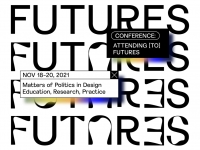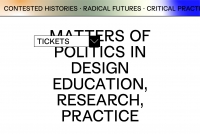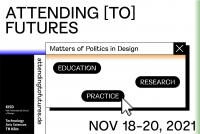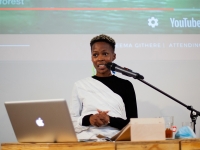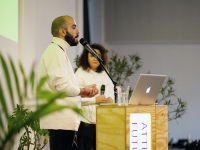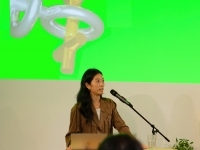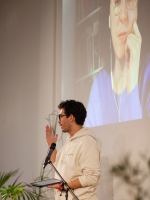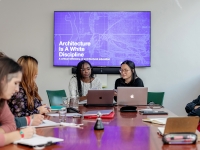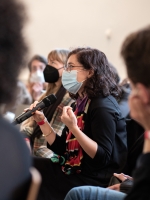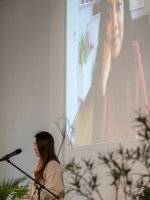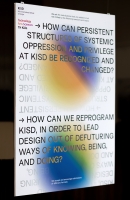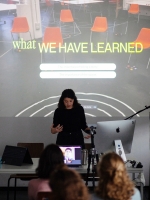KISD _TH Köln | International Conference | Winter 2021/22
ATTENDING [TO] FUTURES: Matters of Politics in Design Education, Research, and Practice, 18-20 November 2021
Organisation: Johanna Mehl, Carolin Höfler, and Michael Gais
The international conference ATTENDING [TO] FUTURES: Matters of Politics in Design Education, Research, and Practice examined the ambivalent role of design in a network of exclusionary, oppressive, and unsustainable practices accountable for social and environmental injustice. Acknowledging the ways in which design (as practices, forms of knowledge, sets of objects, and means of research) enables ongoing structures of systemic violence, this conference invited critical perspectives that scrutinize unchallenged disciplinary norms and dominant ways of knowing, being, doing, and imagining in design education, research, and practice.
Three tracks framed practical and theoretical positions and projects that critically examine the socio-political and ecological consequences of dominant ways of knowing, being, and doing in design and explore the possibilities of subversive practices and alternative teaching-learning scenarios. Lectures, workshops, urban walks, live performances, film screenings, and discussions invited interdisciplinary exchange among designers, activists, researchers, and educators from the fields of design, art, architecture, cultural studies, and anthropology.
Contested Histories
UNLEARNING
The first track critically revised and problematized the eurocentric, patriarchal, colonial, environmentally untenable, and capitalist traditions in which design is embedded and called for an “unlearning” (Gayatri Spivak) of discriminatory, exclusive, oppressive, and “defuturing” (Toni Fry) codes and design practices that came into being because of them. The aim of this track was to expose normative definitions of design, design epistemologies, and established ways of learning in order to understand ‘why we design, what we design’ (loosely based on Mary Lawhon) and to recognize how design produces inequality and subjugation.
Radical Futures
ATTENDING [TO]
The second track considered design’s inherent demand to explore, test, and produce material-discursive configurations that do not (yet) exist (Séverine Marguin et al.) in order to imagine and constitute radically different worlds and form the basis of future design (Daniel Gethmann et al.). Through this lens, the future was addressed as a present “space of becoming” inclusive, empathetic, just, and sustainable (Bill Ashcroft). Designing the future means both attending, i.e. active participation in, and attending to, i.e. taking responsibility and care for, creative ways of living together with people, things, animals, and plants. All future-making strategies require asking whether designs of new possible worlds leave social, political, and economical power structures untouched or whether they undermine and change them.
Critical Practices
LEADING OUT
The third track proceeded from the etymology of education: latin ‘educare’ not as ‘e-ducere’—i.e. ‘leading someone to something’—but as ‘ex-ducere’, ‘leading someone out’ of the familiar (Tim Ingold). Attention to the constitutive conditions of design requires a reckoning with a multiplicity of actors and contexts, from institutional norms and regulations, to pedagogies, curricula, materials, architectural environments, and discursive protocols. This track therefore focused on and called for the transformation of everything that helps bring design into being: physical and digital tools, as well as their material infrastructures and legitimating disciplinary narratives.
Website: https://www.attendingtofutures.de
Program: https://www.attendingtofutures.de/program
Keynotes: https://www.attendingtofutures.de/keynotes
Exhibitions: https://www.attendingtofutures.de/exhibitions
Recordings: https://vimeo.com/showcase/attendingtofutures
Instagram: @attendingtofutures.de
